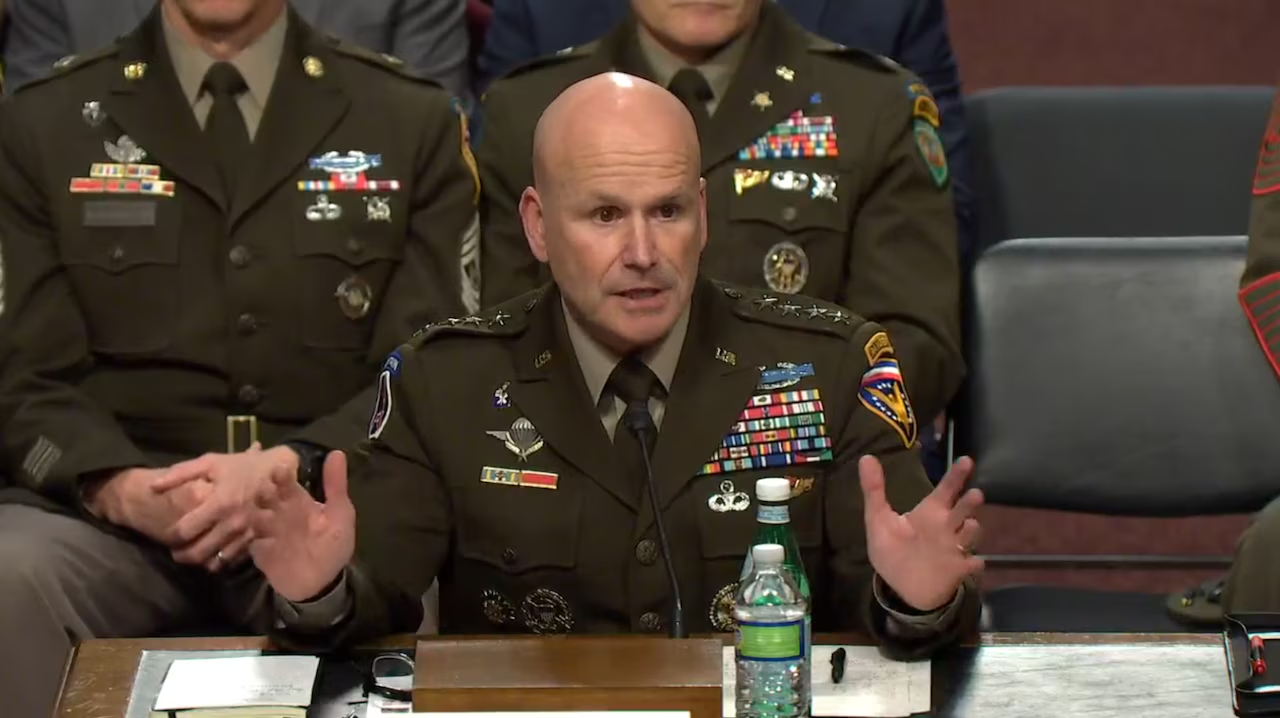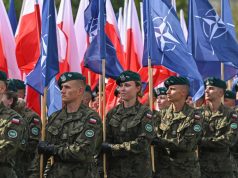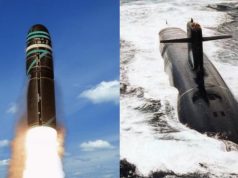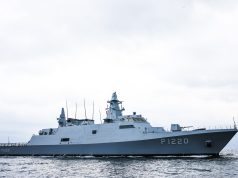Army Gen. Christopher G. Cavoli, commander of U.S. European Command and Supreme Allied Commander Europe, and Marine Corps Gen. Michael E. Langley, commander of U.S. Africa Command, appeared today before the Senate Armed Services Committee to detail how their commands ensure lethality, warfighting readiness, deterrence and peace through strength.
Their testimonies reflected Defense Secretary Pete Hegseth’s focus on building combat-capable forces and modernizing to meet evolving threats while maintaining a strong posture against adversaries like Russia and China. They also addressed critical challenges across Europe and Africa.
Warfighting Insights From Ukraine
The hearing opened with an examination of the Ukraine conflict, now in its third year, and its lessons for U.S. warfighting.
Cavoli said the military honed its lethality by studying the war’s technical and operational dynamics. He noted extensive efforts to adapt tactics, particularly in countering Russian electronic warfare and shifting to smaller, more agile drones at lower echelons, enhancing battlefield flexibility. He underscored the conflict’s scale, with Russia losing over 4,000 tanks, rivaling the U.S. Army’s total holdings.
“I did not anticipate Ukraine to be able to destroy so much of Russia’s warfighting capability,” Cavoli said.
He detailed Ukraine’s strengths, including its hold on Russian territory in Kursk despite North Korean reinforcements and its success in stalling Russian advances in Donetsk with fortified defenses. This, he suggests, reinforces deterrence by demonstrating the cost of aggression.
Nuclear Deterrence and NATO’s Strength
Questions turned to NATO‘s nuclear deterrence, which is vital to Eucom’s mission of maintaining peace through overwhelming strength. Cavoli described his dual roles and detailed a streamlined command process in which he controls nuclear forces in Europe and, if ordered, deploys them under NATO’s consensus, ensuring a rapid, lethal response.
“We would want those under the command of a U.S. officer,” he said, stressing the importance of American leadership in preserving this deterrent.
Cavoli’s testimony affirmed a deterrence posture that leaves no doubt about NATO’s lethal resolve, rooted in over seven decades of success.
Countering Russian and Chinese Aggression
The generals addressed Russian and Chinese threats beyond Ukraine, focusing on deterrence through lethal presence. Cavoli highlighted Russia’s Arctic expansion, with new airfields enabling strikes across the polar cap — the shortest path to U.S. territory — and the Northern Fleet’s attempts to penetrate the Greenland-Iceland-United Kingdom gap with submarine-launched cruise missiles threatening the Atlantic.
Russia’s loss of its Syrian naval base in the Mediterranean has diminished its warfighting reach, though Cavoli noted its pursuit of North African alternatives, which Eucom works to counter.
Langley tackled China’s growing influence in Africa, pointing to its fortified base in Djibouti and efforts to secure Atlantic sites, which could potentially alter the U.S. defense calculus. He stressed Africom’s role in denying China these footholds.
Both generals emphasized the importance of peace through strength — Cavoli through Eucom’s naval deterrence, Langley through partnerships that bolster regional stability — ensuring adversaries face a united, lethal front.
Lethality Against Terrorism in Africa
Langley discussed Africom’s operations against terrorism. He described intensified airstrikes on al-Shabab, bolstered by new authorities that enhance lethality.
“We’re hitting them hard. I have now the capability to hit them harder,” he said, noting their ties with Yemen’s Houthis as a lethal escalation.
Langley also warned of broader terrorist networks, referencing the January 2025 New Orleans attack as proof of their reach if unchecked, and highlighted ISIS’s growing presence in Somalia and the Sahel region of Africa, with Somalia’s networked operations posing a particular challenge. He said Africom’s exercises with over 40 African nations strengthen partner alliances and amplify deterrence.
Peace Through Strength and Leadership
The generals underscored U.S. leadership as essential to deterrence and peace, aligning with goals to leverage alliances for combat effectiveness.
“I see it every day; our allies crave our leadership and are stronger with it, and they’re stronger for us,” Cavoli said, citing historical examples, such as Ukraine’s support in Iraq, to illustrate how U.S. strength inspires allied resolve.
Langley emphasized Africom’s role in convening lethal coalitions, with over 40 countries joining exercises to counter threats like China’s illicit fishing and enhancing regional warfighting capacity.
When pressed on potential command consolidation, Langley noted terrorism’s rise from 2% to 43% of global activity since 2007, arguing for Africom’s distinct mission. Cavoli highlighted Africa’s growing challenges, reinforcing the need for specialized, lethal commands to maintain peace through strength.
#NATO
#SACEUR
#USA




